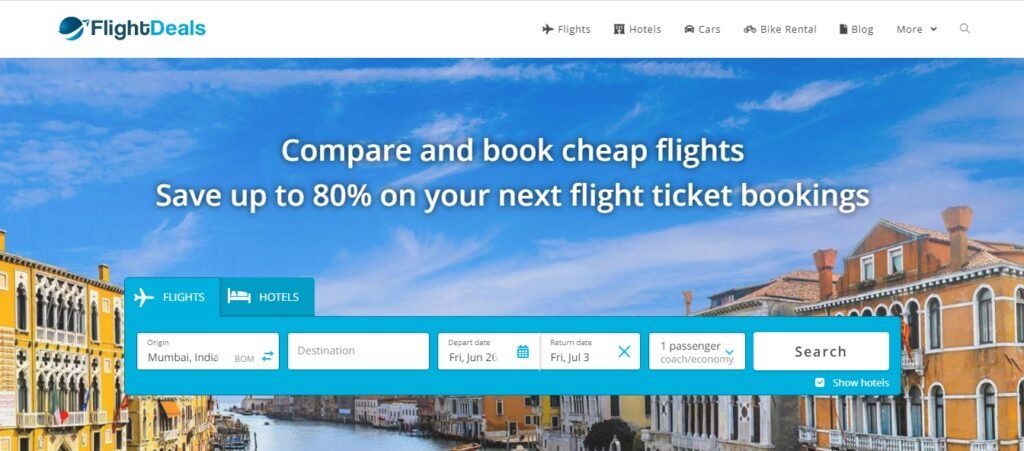Introduction
In the dynamic landscape of online commerce, acquiring a travel website presents a myriad of opportunities and challenges. As an on-page SEO expert in a prominent company specializing in organic traffic generation, I embark on a journey to unravel the intricacies of optimizing content on a newly acquired travel website. This comprehensive guide aims to empower businesses with the knowledge and strategies needed to maximize the potential of their digital asset. Woven seamlessly into this narrative is an exciting promotion—an opportunity to explore a travel website available for acquisition on Sitefy, a trusted platform for digital asset transactions.
The Significance of Content Optimization in Travel Websites
1. Content as the Cornerstone:
In the digital realm, content reigns supreme. For travel websites, compelling, relevant, and optimized content is the cornerstone of success. It not only engages users but also plays a pivotal role in attracting organic traffic.
2. SEO as the Driving Force:
Search Engine Optimization (SEO) is the driving force behind a website’s visibility. Optimizing content aligns the website with search engine algorithms, ensuring higher rankings and increased organic traffic—a crucial aspect for a newly acquired travel website.
3. User Experience Enhancement:
Well-optimized content enhances the overall user experience. It keeps visitors engaged, encourages exploration, and fosters a positive impression, contributing to the website’s authority in the travel niche.
Key Components of Content Optimization
1. Thorough Content Audit:
Before diving into optimization, conduct a comprehensive content audit. Evaluate existing content for relevance, accuracy, and alignment with the website’s goals. Identify areas for improvement and prioritize content that aligns with the target audience.
2. Keyword Research and Integration:
Keyword research is the bedrock of content optimization. Identify relevant and high-traffic keywords in the travel niche. Seamlessly integrate these keywords into the content, ensuring a natural flow that caters to both search engines and users.
3. User Intent Alignment:
Understand user intent and align content accordingly. Develop content that addresses the specific needs, questions, and interests of the target audience. Meeting user intent not only enhances engagement but also signals to search engines that the content is valuable.
4. Optimized Meta Tags and Descriptions:
Craft compelling meta tags and descriptions. These snippets provide a preview of the content to both users and search engines. Optimize them with relevant keywords, enticing language, and a clear call-to-action to encourage click-throughs.
5. Mobile Optimization:
In the era of mobile browsing, ensure content is optimized for mobile users. Responsive design, fast loading times, and a user-friendly mobile experience contribute significantly to higher search engine rankings.
6. Internal and External Linking:
Implement a robust linking strategy. Internal links guide users to related content within the website, enhancing navigation and user experience. External links to reputable sources strengthen the website’s authority in the eyes of search engines.
7. Visual Content Optimization:
Optimize visual content, including images and videos. Compress images for faster loading times, add descriptive alt text for accessibility, and ensure videos are well-embedded and relevant to the travel theme.
8. Content Diversification:
Diversify content types. Alongside traditional written content, incorporate visuals, infographics, and interactive elements. Diverse content not only caters to different user preferences but also adds richness to the website’s offerings.
The SEO Expert’s Role in Content Optimization
As an on-page SEO expert, my role in content optimization is pivotal. Here’s how SEO expertise complements the process:
1. Keyword Research Refinement:
Refine keyword research with SEO insights. Analyze competitor keywords, identify gaps, and prioritize keywords based on search volume, competition, and relevance to the travel niche.
2. On-Page SEO Best Practices:
Implement on-page SEO best practices. Ensure that title tags, headers, and meta descriptions align with SEO guidelines. Leverage SEO tools to monitor on-page elements and make necessary optimizations.
3. Performance Monitoring:
Continuously monitor content performance. Utilize SEO analytics tools to track key metrics, identify high-performing content, and pinpoint areas for improvement or expansion.
4. Adaptation to Algorithm Changes:
Stay abreast of algorithm changes. Search engine algorithms evolve, impacting the effectiveness of current SEO strategies. Adaptation is crucial for maintaining and improving organic traffic.
5. Competitor Analysis:
Conduct competitor analysis for SEO insights. Analyzing competitors’ strategies provides valuable data for refining content optimization, identifying opportunities, and staying ahead in the competitive travel niche.
Embedding Promotion: Introducing Sitefy’s Travel Website for Sale
In the pursuit of optimizing content and exploring opportunities, we introduce an exciting promotion with the integration of Sitefy’s travel website available for acquisition.
Sitefy’s Travel Website for Sale
Key Features:
- Proven Revenue Streams: Benefit from established partnerships and revenue-generating mechanisms that guarantee immediate returns.
- Optimized for Organic Traffic: Leverage the power of a well-optimized website that attracts organic traffic through strategic SEO practices.
- Diverse Income Streams: Enjoy the advantage of multiple income streams, including commissions from bookings, display ads, and sponsored content.
- Scalability and Growth: Strategically positioned for scalability, this website offers growth opportunities as it gains authority and attracts more organic traffic.
Why Choose Sitefy:
- Trusted Transactions: Sitefy ensures secure and transparent transactions, providing a trustworthy platform for digital asset acquisitions.
- Comprehensive Due Diligence: Our vetting process guarantees that you receive accurate information about the website’s traffic sources, content quality, and revenue claims.
- Expert Guidance: Benefit from expert guidance throughout the acquisition process, making your journey into the travel affiliate industry a smooth and informed experience.
Strategies for Effective Content Optimization
1. Data-Driven Decision-Making:
Base content optimization decisions on data. Utilize SEO analytics tools, user behavior data, and keyword performance insights to inform content strategies and improvements.
2. Regular Content Audits:
Conduct regular content audits. Periodically review and update existing content to ensure relevance, accuracy, and alignment with evolving SEO trends and user expectations.
3. A/B Testing:
Implement A/B testing for optimization experiments. Test variations in headlines, meta descriptions, and content structure to identify the most effective elements for improving engagement and search rankings.
4. Feedback Integration:
Integrate user feedback into optimization strategies. User reviews, comments, and feedback provide valuable insights into user preferences and expectations, guiding content improvements.
5. Collaboration with Content Creators:
Collaborate with content creators. Establish clear communication channels between SEO experts and content creators to ensure that SEO strategies are seamlessly integrated into the content creation process.
Overcoming Common Challenges in Content Optimization
1. Keyword Stuffing Avoidance:
Avoid keyword stuffing. While keywords are crucial for SEO, overusing them can lead to a poor user experience and potential penalties from search engines. Strike a balance between optimization and readability.
2. Balancing SEO and User Experience:
Balance SEO requirements with user experience. SEO optimization should enhance, not hinder, the user experience. Ensure that content remains valuable, informative, and enjoyable for users.
3. Adapting to Algorithm Changes:
Adapt to algorithm changes swiftly. Search engine algorithms evolve, and staying ahead of these changes is crucial for maintaining and improving organic traffic. Regularly update content strategies based on algorithm updates.
4. Monitoring for Outdated Information:
Regularly monitor content for outdated information. In the dynamic travel industry, information quickly becomes outdated. Regularly review and update content to ensure accuracy and reliability.
5. Consistency Across Platforms:
Maintain consistency across platforms. Whether it’s the website, social media channels, or other digital platforms, ensure that content is consistent in messaging, branding, and SEO strategies.
The Role of SEO in Ensuring Content Optimization Success
1. SEO as a Growth Catalyst:
Position SEO as a growth catalyst. A well-optimized travel website not only attracts organic traffic but also sets the stage for growth by enhancing search engine rankings, visibility, and user engagement.
2. Strategic SEO Adaptation:
Adapt SEO strategies strategically. As the travel industry evolves, SEO strategies must adapt to changing user behavior, industry trends, and search engine algorithms. A proactive approach ensures continued success.
3. Competitive Edge:
Leverage SEO for a competitive edge. In a crowded online space, effective SEO strategies distinguish a travel website from its competitors, positioning it as a reliable source for travel-related information and services.
4. Enhanced User Trust:
Enhance user trust through SEO practices. A website that consistently delivers relevant, well-optimized content builds trust with users and establishes itself as an authority in the travel niche.
Conclusion
Optimizing content on a newly acquired travel website is not just a task—it’s a strategic imperative for success in the competitive online landscape. As an on-page SEO expert, my role in this journey is to ensure that optimization efforts align with SEO best practices, user expectations, and the overarching goals of the website.
By combining the power of SEO expertise with a thorough understanding of content optimization, businesses can unlock the full potential of their newly acquired travel websites. The integration of Sitefy’s travel website promotion adds an extra layer of opportunity, providing readers with a valuable resource to explore and potentially initiate their journey into the world of online business acquisitions.
In the realm of digital success, content optimization is the compass that guides the way. It’s not just about attracting traffic; it’s about crafting an online presence that resonates with users, engages audiences, and establishes the website as a go-to destination in the vast landscape of travel-related information.



